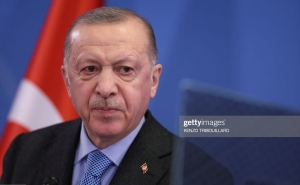Erdogan-Constitutional Court Struggle Continues

After the 2010 constitutional amendments in Turkey the powers of the Constitutional Court changed. If previously Court took its decisions in the form of plenary, after the amendments, when individual applications were introduced, two Sections and three Commissions under each Section have been established. Due to these amendments the Constitutional Court is now taking such decisions that angers Erdogan.
Another reason for Erdogan’s fury was the ruling of the Court to release two Turkish opposition journalists charged with revealing state secrets. According to alaraby.co.uk the Cumhuriyet newspaper's editor-in-chief Can Dundar and Ankara bureau chief Erdem Gul have been detained since November over a report alleging that Erdogan's government tried to ship arms to Islamists rebels in Syria.
According to the ruling of the Constitutional Court the imprisonment of the two prominent journalists is a violation of their rights to the freedom of expression. However, Erdogan’s reaction to this was quite furious, saying that he does not respect the ruling. "The Constitutional Court may have reached such a verdict. I would only remain silent. I am not in a position to accept it. I do not obey it nor do I respect it," Hurriyet quotes Erdogan’s words. According to him, media cannot have unlimited freedom, calling what Dundar and Gul wrote as an attack on him. Of course, everything has its limits – including any kind of freedom, but it seems Erdogan’s limits to the freedom of expression are equal to no freedom. This is not the only case that journalists were arrested for "insulting" Erdogan, as he likes to say. In the first seven months of Erdogan’s presidency, 236 people were investigated - and 105 were indicted - for allegedly insulting the president. Among them are journalists as well as students, civil activists, scholars, artists, and even a former Miss Turkey, euobserver wrires. However, it was especially during the Turkish parliamentary elections in 2015 Turkey’s policy towards media freedom became obvious for the whole world. "There, we have seen worrying developments in the last weeks in the run-up to the elections, such as the intimidation of journalists in various forms. Let me be very clear: Freedom of media is at the core of the EU integration process and is not negotiable," Johannes Hahn, the European Commissioner in charge of enlargement negotiations, said in November, 2015, The Wall Street Journal writes.
Anyway, to come back to Erdogan-Constitutional Court struggle, some other examples should also be brought to show that there were other rulings as well that made Erdogan angry. In 2015 a law that the AKP passed some 16 months ago declaring all private university prep courses illegal was annulled by the Court. Earlier, in 2014 when the Turkish government banned Twitter, the Court called the Twitter ban "illegal, arbitrary and a serious restriction on the right to obtain information," the New York Times reports.
So what is the reason that the judges of the Constitutional Court do not "obey" Erdogan and make him angry? The Constitutional Court has 17 judges, of whom three were appointed by President Ahmet Necdet Sezer, 10 by Gul, three were elected by the parliament and only one appointed by Erdogan. This shows that the judges are not his "people" and he has not much leverage on them. However, with constitutional amendments that Erdogan for so long time is seeking, this "mistake" will most likely be corrected.
Other materials on this subject
- 2 dead, 2 injured after fire at lodging section of Armenian Catholic Church in Istanbul He said the firefighter-rescue team arrived immediately. Armenian Catholic Archeparch of Istanbul Archbishop Lévon Zékiyan was also on the scene.
- Turkey is sending Cold War-era cluster bombs to Ukraine – FP The weapons are designed to destroy tanks by bursting into smaller submunitions, which can linger on the battlefield for years if they do not immediately explode. Each round scatters about 88 bomblets.
- Fire erupts in Turkey’s Black Sea port of Samsun following explosion The causes for the explosion that led to a fire are currently being analyzed.
- EU Urges Turkey to Stop Offering Russia Solutions to Circumvent Sanctions Speaking about the EU's engagement with Turkey, an important neighbor, EU partner and candidate country for EU membership, we stress the importance of ensuring that Turkey's foreign policy is aligned with...
- Any Change of Internationally Recognized Borders in Region is Unacceptable – Iranian President to Erdogan "The basis of our policy in the region is that the fates of the countries must be determined by themselves and that their national sovereignty and territorial integrity must be respected" Raisi told Erdogan...
-
 17:08
17:08The regular session of the Anti-corruption Policy Council takes place in Jermuk
-
 15:05
15:05The Prime Minister sends congratulatory messages to the supreme leader of Iran and the President of Iran
-
 11:11
11:11Armenia sends earthquake aid to Turkey
-
 10:43
10:43Commemoration of the Pontiff St. Sahak Partev
-
 09:16
09:16Some roads are closed and difficult to pass in Armenia
-
 19:55
19:55Phone conversation of the Foreign Minister of Armenia with the U.S. Assistant Secretary of State for European and Eurasian Affairs
-
 18:30
18:30Prime Minister Pashinyan and President Khachaturyan meet
-
 18:20
18:20Ararat Mirzoyan with Co-Chairman of the OSCE Minsk Group of France Brice Roquefeuil
-
 17:01
17:01Humans could land on Mars within 10 years, Musk predicts
-
 16:45
16:45France, US urge 'immediate' end to Nagorno Karabakh blockade
-
 16:01
16:01Blockaded Nagorno Karabakh launches fundraiser to support quake-hit Syria
-
 15:59
15:59Earthquake death toll in Turkey rises to 18,342
-
 15:43
15:43Ararat Mirzoyan Held a Telephone Conversation with Sergey Lavrov
-
 15:06
15:06French president rules out fighter jet supplies to Ukraine in near future
-
 14:47
14:475 Day Weather Forecast in Armenia
-
 14:44
14:44President Vahagn Khachaturyan wrote a note in the book of condolences opened in the Embassy of Syria in Armenia
-
 14:20
14:20Azerbaijan’s provocations impede establishment of peace and stability – Armenian FM tells Russian Co-Chair of OSCE MG
-
 12:57
12:57France representation to OSCE: Paris calls on Azerbaijan to restore freedom of movement through Lachin corridor
-
 11:40
11:40Command of Kosovo forces highly appreciated preparation of Armenian peacekeepers
-
 10:16
10:16The United States withdrew from sanctions against Syria for six months the provision of assistance after the earthquake
day
week
month
Humidity: %
Wind: km/h









